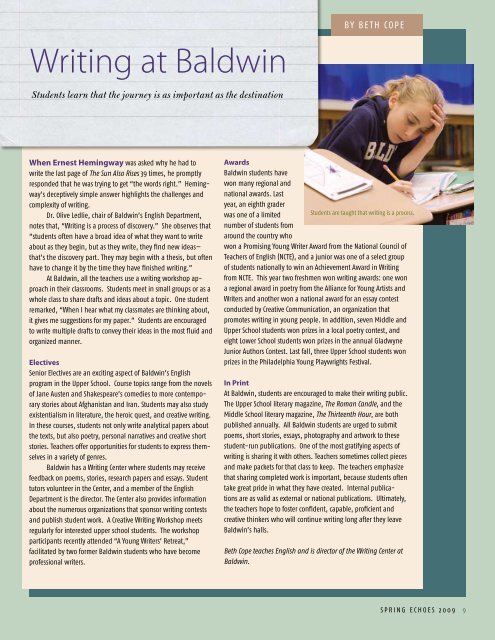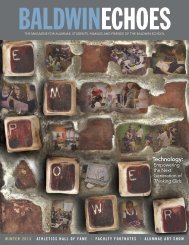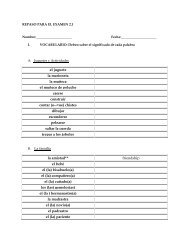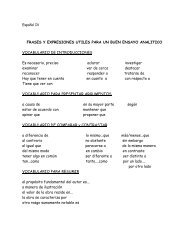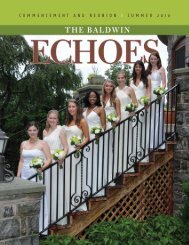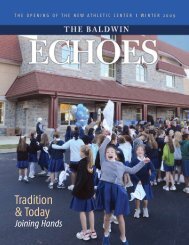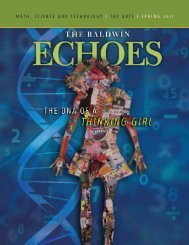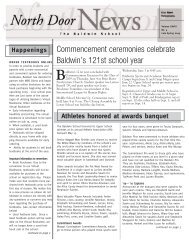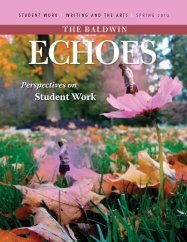Spring 2009 - Baldwin School
Spring 2009 - Baldwin School
Spring 2009 - Baldwin School
You also want an ePaper? Increase the reach of your titles
YUMPU automatically turns print PDFs into web optimized ePapers that Google loves.
Writing at <strong>Baldwin</strong><br />
Students learn that the journey is as important as the destination<br />
When Ernest Hemingway was asked why he had to<br />
write the last page of The Sun Also Rises 39 times, he promptly<br />
responded that he was trying to get “the words right.” Hemingway’s<br />
deceptively simple answer highlights the challenges and<br />
complexity of writing.<br />
Dr. Olive Ledlie, chair of <strong>Baldwin</strong>’s English Department,<br />
notes that, “Writing is a process of discovery.” She observes that<br />
“students often have a broad idea of what they want to write<br />
about as they begin, but as they write, they find new ideas—<br />
that’s the discovery part. They may begin with a thesis, but often<br />
have to change it by the time they have finished writing.”<br />
At <strong>Baldwin</strong>, all the teachers use a writing workshop approach<br />
in their classrooms. Students meet in small groups or as a<br />
whole class to share drafts and ideas about a topic. One student<br />
remarked, “When I hear what my classmates are thinking about,<br />
it gives me suggestions for my paper.” Students are encouraged<br />
to write multiple drafts to convey their ideas in the most fluid and<br />
organized manner.<br />
Electives<br />
Senior Electives are an exciting aspect of <strong>Baldwin</strong>’s English<br />
program in the Upper <strong>School</strong>. Course topics range from the novels<br />
of Jane Austen and Shakespeare’s comedies to more contemporary<br />
stories about Afghanistan and Iran. Students may also study<br />
existentialism in literature, the heroic quest, and creative writing.<br />
In these courses, students not only write analytical papers about<br />
the texts, but also poetry, personal narratives and creative short<br />
stories. Teachers offer opportunities for students to express themselves<br />
in a variety of genres.<br />
<strong>Baldwin</strong> has a Writing Center where students may receive<br />
feedback on poems, stories, research papers and essays. Student<br />
tutors volunteer in the Center, and a member of the English<br />
Department is the director. The Center also provides information<br />
about the numerous organizations that sponsor writing contests<br />
and publish student work. A Creative Writing Workshop meets<br />
regularly for interested upper school students. The workshop<br />
participants recently attended “A Young Writers’ Retreat,”<br />
facilitated by two former <strong>Baldwin</strong> students who have become<br />
professional writers.<br />
BY BETH C O P E<br />
Awards<br />
<strong>Baldwin</strong> students have<br />
won many regional and<br />
national awards. Last<br />
year, an eighth grader<br />
was one of a limited<br />
Students are taught that writing is a process.<br />
number of students from<br />
around the country who<br />
won a Promising Young Writer Award from the National Council of<br />
Teachers of English (NCTE), and a junior was one of a select group<br />
of students nationally to win an Achievement Award in Writing<br />
from NCTE. This year two freshmen won writing awards: one won<br />
a regional award in poetry from the Alliance for Young Artists and<br />
Writers and another won a national award for an essay contest<br />
conducted by Creative Communication, an organization that<br />
promotes writing in young people. In addition, seven Middle and<br />
Upper <strong>School</strong> students won prizes in a local poetry contest, and<br />
eight Lower <strong>School</strong> students won prizes in the annual Gladwyne<br />
Junior Authors Contest. Last fall, three Upper <strong>School</strong> students won<br />
prizes in the Philadelphia Young Playwrights Festival.<br />
In Print<br />
At <strong>Baldwin</strong>, students are encouraged to make their writing public.<br />
The Upper <strong>School</strong> literary magazine, The Roman Candle, and the<br />
Middle <strong>School</strong> literary magazine, The Thirteenth Hour, are both<br />
published annually. All <strong>Baldwin</strong> students are urged to submit<br />
poems, short stories, essays, photography and artwork to these<br />
student-run publications. One of the most gratifying aspects of<br />
writing is sharing it with others. Teachers sometimes collect pieces<br />
and make packets for that class to keep. The teachers emphasize<br />
that sharing completed work is important, because students often<br />
take great pride in what they have created. Internal publications<br />
are as valid as external or national publications. Ultimately,<br />
the teachers hope to foster confident, capable, proficient and<br />
creative thinkers who will continue writing long after they leave<br />
<strong>Baldwin</strong>’s halls.<br />
Beth Cope teaches English and is director of the Writing Center at<br />
<strong>Baldwin</strong>.<br />
S P R I N G E C H O E S 2 0 0 9 9


